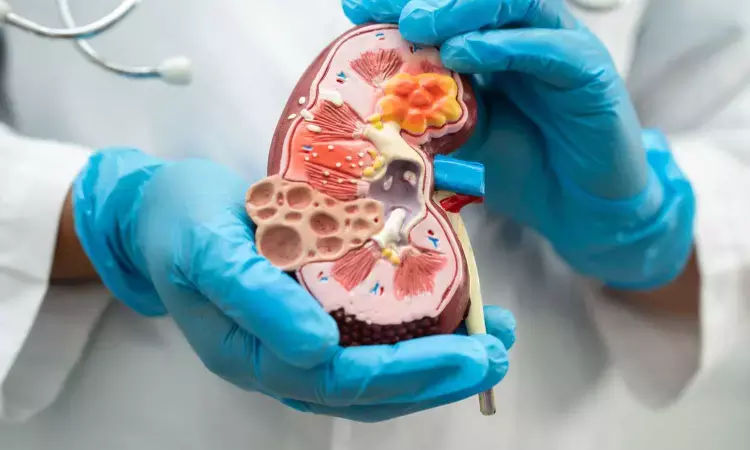- Home
- Medical news & Guidelines
- Anesthesiology
- Cardiology and CTVS
- Critical Care
- Dentistry
- Dermatology
- Diabetes and Endocrinology
- ENT
- Gastroenterology
- Medicine
- Nephrology
- Neurology
- Obstretics-Gynaecology
- Oncology
- Ophthalmology
- Orthopaedics
- Pediatrics-Neonatology
- Psychiatry
- Pulmonology
- Radiology
- Surgery
- Urology
- Laboratory Medicine
- Diet
- Nursing
- Paramedical
- Physiotherapy
- Health news
- Fact Check
- Bone Health Fact Check
- Brain Health Fact Check
- Cancer Related Fact Check
- Child Care Fact Check
- Dental and oral health fact check
- Diabetes and metabolic health fact check
- Diet and Nutrition Fact Check
- Eye and ENT Care Fact Check
- Fitness fact check
- Gut health fact check
- Heart health fact check
- Kidney health fact check
- Medical education fact check
- Men's health fact check
- Respiratory fact check
- Skin and hair care fact check
- Vaccine and Immunization fact check
- Women's health fact check
- AYUSH
- State News
- Andaman and Nicobar Islands
- Andhra Pradesh
- Arunachal Pradesh
- Assam
- Bihar
- Chandigarh
- Chattisgarh
- Dadra and Nagar Haveli
- Daman and Diu
- Delhi
- Goa
- Gujarat
- Haryana
- Himachal Pradesh
- Jammu & Kashmir
- Jharkhand
- Karnataka
- Kerala
- Ladakh
- Lakshadweep
- Madhya Pradesh
- Maharashtra
- Manipur
- Meghalaya
- Mizoram
- Nagaland
- Odisha
- Puducherry
- Punjab
- Rajasthan
- Sikkim
- Tamil Nadu
- Telangana
- Tripura
- Uttar Pradesh
- Uttrakhand
- West Bengal
- Medical Education
- Industry
Lower-Dose Immunosuppression Equally Effective in Older Kidney Transplant Recipients: Study

The OPTIMIZE trial found that adults aged 65 and older had similar rates of successful kidney transplantation when treated with a lower-dose immunosuppression regimen compared to standard dosing. The study was published in the Journal of The American Scociety of Nephrology by Sanders and colleagues.
Kidney transplantation remains the treatment of choice for end-stage renal disease, even in older adults. However, balancing immunosuppression against the risk of drug-related toxicity to prevent graft rejection remains a challenge in this population. A hypothesis has been raised that with reduced immune responsiveness accompanying aging, older recipients may benefit from lower immunosuppressive exposure. The OPTIMIZE study tested whether a regimen combining low-dose tacrolimus with everolimus and prednisolone might improve long-term graft and patient outcomes compared with standard-dose tacrolimus, mycophenolate mofetil, and prednisolone.
The OPTIMIZE trial was a multicenter, randomized, controlled clinical study that enrolled kidney transplant recipients who were aged 65 years or older. Of 379 patients, 198 were randomized to stratum A (recipients of kidneys from deceased donors older than 65 years) and 181 to stratum B (recipients of kidneys from younger deceased or living donors). Participants were assigned either to the TEP group (low-dose tacrolimus, everolimus, prednisolone) or to the TMP group (standard-dose tacrolimus, mycophenolate mofetil, prednisolone).
In the TEP group, tacrolimus trough levels were maintained at 5–7 ng/mL until 3 months, 2–4 ng/mL from 3–6 months, and 1.5–4 ng/mL thereafter. The respective trough levels for these time frames in the TMP group were 8–12 ng/mL, 6–10 ng/mL, and 5–8 ng/mL. Successful transplantation was defined as being alive with a functioning graft and an eGFR above 30 mL/min/1.73m² (for stratum A) or 45 mL/min/1.73m² (for stratum B) at 2 years post-transplantation.
Results
• No statistically significant difference was found between the 2 arms in successful transplantation rates.
• By 2 years, successful transplantation was achieved by 50% (n=94) of patients in the TEP group and 57% (n=110) in the TMP group (difference 7%; 95% CI, −17 to 3; P=0.91).
• In fact, patient survival was almost exactly comparable, with 89% (n=167) in the TEP group versus 89% (n=171) in the TMP group (P=0.95).
• Graft survival was similarly not significantly different, seen in 83% (n=155) for the TEP group and 84% (n=162) for the TMP group (P=0.65).
• In addition, there were no significant differences observed in any major endpoint in stratified analysis based on donor age: strata A and B.
The OPTIMIZE trial concluded that immunosuppression with low-dose tacrolimus, everolimus, and prednisolone did not result in superior success of transplantation, kidney function, or survival compared to a standard-dose tacrolimus, mycophenolate mofetil, and prednisolone regimen. Researchers emphasize that standard immunosuppressive regimens remain appropriate for elderly kidney transplant recipients, since reduced tacrolimus dosing confers no additional clinical benefit.
Reference:
Sanders, Jan-Stephan F.1; de Boer, Silke E.1; Jonker, Jip1; Bemelman, Frederike J.2; Betjes, Michiel G.H.3; de Vries, Aiko P.J.4; Hilbrands, Luuk5; Hilhorst, Marc2; Kuypers, Dirk R.J.6; Vart, Priya1; van Zuilen, Arjan D.7; Hesselink, Dennis A.3; Berger, Stefan P.1. Immunosuppression in Older Kidney Transplant Recipients: A Randomized Controlled Trial. Journal of the American Society of Nephrology ():10.1681/ASN.0000000924, November 7, 2025. | DOI: 10.1681/ASN.0000000924
Dr Riya Dave has completed dentistry from Gujarat University in 2022. She is a dentist and accomplished medical and scientific writer known for her commitment to bridging the gap between clinical expertise and accessible healthcare information. She has been actively involved in writing blogs related to health and wellness.
Dr Kamal Kant Kohli-MBBS, DTCD- a chest specialist with more than 30 years of practice and a flair for writing clinical articles, Dr Kamal Kant Kohli joined Medical Dialogues as a Chief Editor of Medical News. Besides writing articles, as an editor, he proofreads and verifies all the medical content published on Medical Dialogues including those coming from journals, studies,medical conferences,guidelines etc. Email: drkohli@medicaldialogues.in. Contact no. 011-43720751


